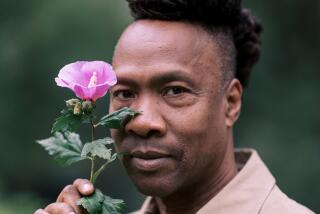THE COLLECTED POEMS OF WILLIAM CARLOS WILLIAMS Volume I, 1909-1939 edited by A. Walton Litz and Christopher MacGowan (New Directions: $35; 544 pp.)
- Share via
“Characteristically American” is the epithet that graces the dust jacket of this new, revised edition of the first 30 years of William Carlos Williams’ achievement. It is an apt phrase; it is also a varietal and prejudicial one, for it discriminates among persons, places and things American.
When we use it, we do not mean Sunset Boulevard as it wends through Beverly Hills; we mean Sunset east of Western. We mean the World Series, not the America’s Cup; H.S.T., not J.F.K., and in poetry, Dr. Bill Williams of Rutherford, N.J., not Wallace Stevens, a vice president of Hartford Indemnity.
The good doctor suffered from two afflictions. The first was as severe a handicap as a poet can have, an inability to write in metrical language. One does not know whether to laugh or politely look away from the early attempts we have in the present volume--and they are not the earliest.
Williams’ diagnosis of his problem took the form of a confusion of the poetic diction of a species (the English poets) with the language (metrical) of the genus. His solution he modeled on the immigrants he lived among and cared for; he turned his back on the legacy of the past. This should have led to disaster. They were rejecting the masters of cruelty; he was rejecting the masters of the language. But we are talking about someone who had a genius for prose.
He would divide his prose into lines, the brevity of those lines giving an aura of simplicity to his sometimes elaborate syntax. He would approach refrain through the repetition of phrases, though the words themselves would cunningly pay homage to the small talk of his patients. He would celebrate American stereotypes in loving anecdote, and he would ask us again and again to LOOK! and look again at “reddish/ purplish, forked, and upstanding, twiggy/ stuff” and “cinders/ in which shine/ the broken/ pieces of green/ bottle.” His triumph over his handicap would be a triumph of the compensatory.
A superbly sensitive ear for rhythm, as distinct from meter, an unflinching eye, and a good heart would make him a one-of-a-kind poet. William Carlos Williams would become an American original.
There were drawbacks, of course. There is an elevation to meter that permits song, definitive statement, and the meditative voice of the inner life; these were not available to him. But then no poet does it all. It is the company of poets, the tradition, that finally must answer to our needs.
Williams’ second affliction is a common one among poets, an occupational hazard. He yearned for fame, that last infirmity. His dear bohemian friend Ezra Pound, the impresario of the Muse, sailed to the Old World, and discovered T. S. Eliot, and proclaimed him the poet of the New. There are some friendships that can break hearts as surely as a love affair.
The loneliness and insecurity of an original is always terrible, unless he be a saint. Williams wanted others to like him and be like him. He craved disciples, his very own company of poets. He hankered after the acclaim of the academics that he loathed. And he got his wish, and near the end began to feel dismay.
Today, the example of a genius working within limitation to achieve the exquisite articulation of things inarticulate is taken for a license to embrace the limitations of inarticulateness.
But poets enter heaven not on the strength of their influence on other poets but on the impact of their poems on the ideal common reader. That reader will find in this beautifully edited collection, with its many previously misplaced poems and helpful notes, the simples and nostrums of a great practitioner. Read two or three at bedtime and as many as you like whenever you like.
More to Read
Sign up for our Book Club newsletter
Get the latest news, events and more from the Los Angeles Times Book Club, and help us get L.A. reading and talking.
You may occasionally receive promotional content from the Los Angeles Times.










